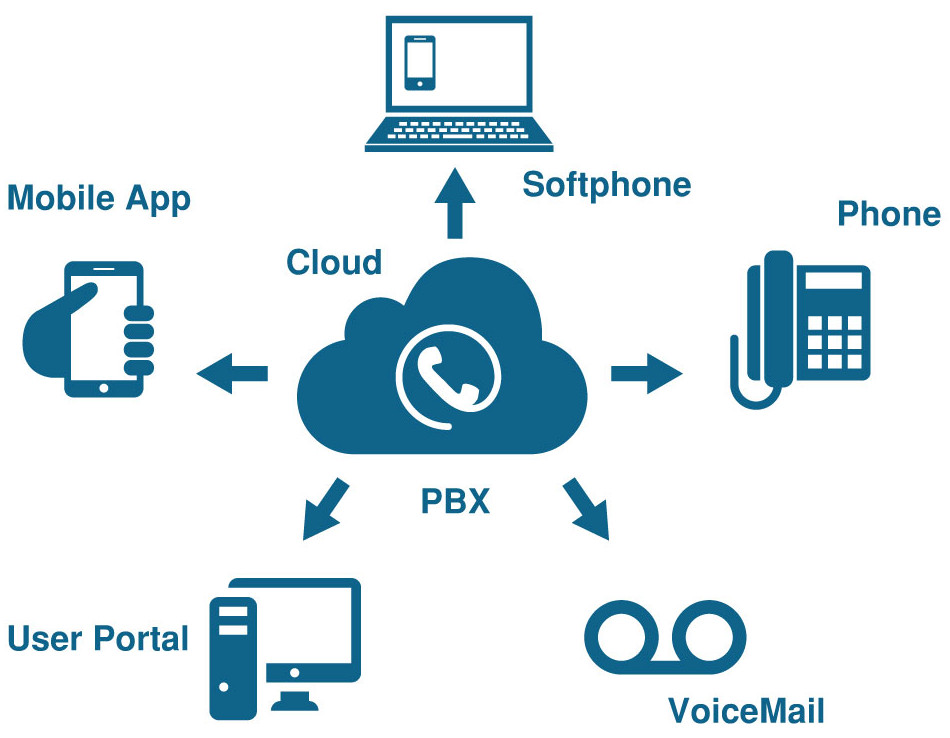A good communication system is the backbone of every business irrespective of its size and type. This is why organizations are always striving to improve their communication technologies. Although a few years back, most of the companies were relying on traditional landline phone systems and on-premises PBX, yet after the hosted PBX came into existence majority of the businesses have upgraded their technologies to now see benefits and advantages of VoIP for business. There are many reasons for this transformation that we will discuss in the latter part of this blog. However, one thing is certain, cloud PBX technology is far superior, economical, and reliable than others.
Many people are of the view that with a hosted phone system, your data resides in off-site data centers that can be a security risk. But in reality, advancements in cybersecurity and non-stop efforts of the service providers have mitigated this risk. The hosting service providers run the latest security software in order to fully safeguard all their managed systems and the data they hold. In this article, we will explore the reasons why this technology has revolutionized business communication.
Table of Contents
What is Cloud PBX?
Cloud-based Private Branch Exchange is a virtual private business phone system or network that allows users to communicate and route calls over the Internet as opposed to on-premises hardware. Unlike on-premise PBX or landline, cloud PBX stores and manages data in the cloud and the service provider is responsible for doing all this.
On-premises PBX needs expensive hardware, expensive contracts, and additional fees for advanced features and support. With cloud technology, on the other hand, you need no hardware, and even the installation is very quick. Also, service providers allow admins to manage their own systems. Unlike landline where you have to change your phone number with location, cloud technology provides you a VoIP number that is irrespective of the location.
How Does VoIP Technology Work?
With cloud phones, customer data and voice communications rely on your existing internet to function. In VoIP technology, the analog voice signals are converted into digital data packets. Then your cloud phone system transmits these packets over the internet.
When someone makes a call, the call data is transformed into digital data packets. Your cloud PBX system then routes these packets over the Internet to the other end (receiver’s end). Once the data reaches the recipient, the PBX system will convert the packets back into analog signals. These voice signals become a recognizable message for the receiver. To your surprise, all this is done within microseconds. All this process works in both local as well as VoIP international calling.
Advantages of Hosted PBX that Transformed the Communication Industry:
There are many benefits of hosted PBX over all other technologies. The powerful features it offers have revolutionized the communication world.
Call Recording:
The feature of call recording facilitates businesses to keep a record of their calls. And this thing is particularly beneficial for call centre businesses. This is because they need to monitor calls for compliance purposes or training. Furthermore, this feature also helps individuals to review their own calls as part of their own personal development.
Virtual Attendant (IVR):
As most businesses receive a high volume of calls on a daily basis and they can not attend to all of them; therefore, they need assistance in that. Most cloud services provide this assistance in the shape of IVR. This feature enables customers to guide themselves through the caller journey and often self-serve when it comes to common queries or frequent complaints.
Reporting and Analytics:
Every business wants to collect and analyze its calling data for improving its operations and a cloud PBX technology provides it. Many PBX systems provide businesses information like the number of answered or missed calls, amount of time spent on a call, the number of calls answered by each agent, and call volumes or peak times. This real-time information helps managers to monitor the performances and efficiency of their agents.
Call Queuing:
Hosted PBX offer users the feature of call queuing. This allows them to place inbound callers into a queue so agents can accept calls in a timely manner. A call queue is essentially a virtual line-up of callers waiting to be connected. When a customer tries to communicate with your organization but the agents are busy, this feature keeps them waiting. While on the call, they will listen to music or recording to help make their wait time feel shorter.
Audio and Video Conferencing:
This technology allows you to make audio or video conference calls from your VoIP number. Most Cloud PBX service providers offer this as a built-in feature to their clients. This feature will not only help you in local calling but VoIP international calling how to site.












